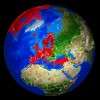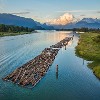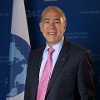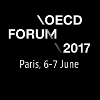The Organisation for Economic Co-operation and Development (OECD)
IIASA collaborates with the OECD in the following areas:
The economic benefits of air quality improvements in the Arctic
A new report released by the Organisation for Economic Co-operation and Development (OECD) assessed the biophysical and economic benefits of air pollution policies in Arctic Council countries. The analysis relied on a suite of modeling tools, including the IIASA GAINS model, to project the impacts of increasingly ambitious policy action up to 2050. More
New OECD Report: The Economic Benefits of Air Quality Improvements in Arctic Council Countries
The OECD launched a new report on 28 April 2021 that assesses the biophysical and economic benefits of air pollution policies in Arctic Council countries. The analysis relies on a suite of modelling tools - including IIASA's GAINS model - to project the impacts of increasingly ambitious policy action up to 2050, compared with business as usual. More
The causes and consequences of depopulation
The IIASA Population and Just Societies Program, the Austrian Academy of Sciences, and the University of Vienna are co-organizing the Wittgenstein Centre Conference 2021, which will focus on population decline and its consequences. More
OECD-IIASA Strategic Partnership: Fourth Task Force meeting
The Organisation for Economic Co-Operation and Development (OECD) and IIASA are presenting the Fourth OECD-IIASA Systems Thinking, Anticipation, and Resilience Task Force meeting on Systemic Recovery. More
IIASA at the OECD Government After Shock Global Forum
Elena Rovenskaya speaks at the high-level Government After Shock Global Forum to help inform a global dialogue on systemic change needed beyond COVID-19 crisis. More
OECD-IIASA Strategic Partnership on Systems Approaches
After having cooperated on topics of mutual interest for many years, the Organisation for Economic Co-operation and Development (OECD) and IIASA agreed in late 2017 to establish the OECD-IIASA Strategic Partnership on Systems Thinking, Anticipation, and Resilience. More
Water Nexus Policy Strategic Planning
Water is a truly cross-sectorial resource that has an impact on population well-being, economic growth, and the environment. Developing resilient (“no-regret”) water strategies given conflicting interests and great uncertainty is of the highest importance for the sustainable development of any country. Feasible policies should reconcile conflicting interests of different sectors and different stakeholders and should take a proper account of immense uncertainty about the future availability of water resources and key factors, which impact it. More
New systemic approach needed to tackle global challenges
Putting systemic thinking at the centre of policymaking will be essential to address global issues in an era of rapid and disruptive change, according to a new joint report by IIASA and the Organisation for Economic Co-operation and Development (OECD). More
OECD-IIASA Strategic Partnership: Third Task Force meeting
A high-level IIASA delegation visited the Organisation for Economic Co-Operation and Development (OECD) for the third meeting of the IIASA-OECD Task Force on Systems Thinking, Anticipation, and Resilience. More
IIASA at OSCE Ministerial Council
IIASA organized a side event at the 26th OSCE Ministerial Council to discuss economic cooperation in Eurasia in the times of digital transformations. More
IIASA at OECD conference: Averting Systemic Collapse
The OECD initiative New Approaches To Economic Challenges (NAEC) hosted a conference on the interconnections between financial, economic, environmental, and societal systems. Participants explored the latest scientific findings and policies on how stressed and strained complex systems could be placed on a sounder footing through strengthened buffers, safeguards, and systemic resilience. More
New analytical tools and techniques for economic policymaking
IIASA and other partners are co-hosting a conference in association with the OECD initiative, New Approaches to Economic Challenges (NAEC). Participants will explore economic issues such as growth, financial crises, and systemic risk with a focus on tools and approaches that contribute to a better understanding of the complexity and interaction of our economic, financial, social, and environmental systems. More
IIASA and the OECD strengthen their strategic partnership
A high-level delegation from the Organisation for Economic Co-operation and Development (OECD) visited IIASA for the second meeting of the IIASA-OECD Task Force focusing on systems thinking, anticipation, and resilience. More
Water Nexus Policy Strategic Planning Workshop
Water is a truly cross-sectorial resource that has an impact on population well-being, economic growth, and environment. Developing resilient (“no-regret”) water strategies given conflicting interests and great uncertainty is of the highest importance for the sustainable development of any country. This workshop organized by IIASA in partnership with Organization for Economic Co-operation and Development (OECD) involves a group of senior officials who will take part in a gamified participatory capacity development process. More
Organisation for Economic Co-operation and Development Secretary-General Angel Gurría visits IIASA
OECD Secretary-General Angel Gurira led a high-level OECD delegation to visit IIASA, the Secretary-General gave a special lecture titled "Better Policies to meet the Systemic Challenges of the 21st Century" at the Austrian Federal Ministry of Education, Science and Research, which was followed by the signing of a new OECD-IIASA Memorandum of Understanding. More
IIASA - Organisation for Economic Co-operation and Development taskforce meets in Paris
IIASA Director General and CEO Professor Dr. Pavel Kabat will lead an official delegation visit to Paris, to enhance research collaborations with the Organisation for Economic Co-operation and Development (OECD). More
Leena Ilmola-Sheppard participated in the OECD Forum
The OECD Forum took place on 6-7 June 2017 during OECD Week, at the OECD Conference Centre in Paris, France. More
IIASA leadership visits Organisation for Economic Co-operation and Development
IIASA Director General and CEO Professor Dr. Pavel Kabat will lead an official delegation visit to Paris, to enhance research collaborations with the Organisation for Economic Co-operation and Development (OECD). During his visit, Kabat will attend high-level meetings with OECD stakeholders and the Austrian Ambassador in Paris, and also give a lecture on systems analysis to OECD staff. More
IIASA leadership visits Organisation for Economic Co-operation and Development
IIASA Director General and CEO Professor Dr. Pavel Kabat will lead an official delegation visit to Paris, to enhance research collaborations with the Organisation for Economic Co-operation and Development (OECD). During his visit, Kabat will attend high-level meetings with OECD stakeholders and the Austrian Ambassador in Paris, and also give a lecture on systems analysis to OECD staff. More
NEWS
"Climate Modernity" - The 24H Challenge: How do we want to live and act in the future in Styria ?
Health fears can increase pandemic isolation habits in older Europeans
How circular waste management systems can benefit the environment
Launch of the Northern African Applied Systems Analysis Centre
How we measure the effects of methane matters for climate policy


















_cropped.jpg)